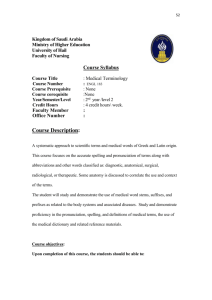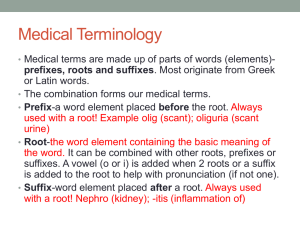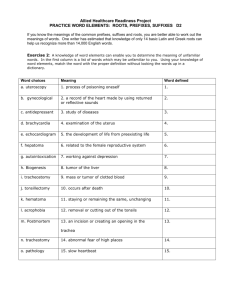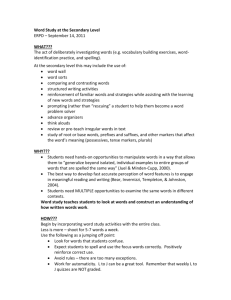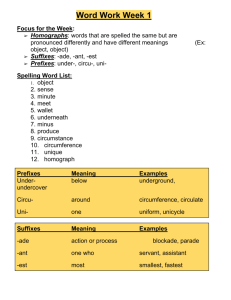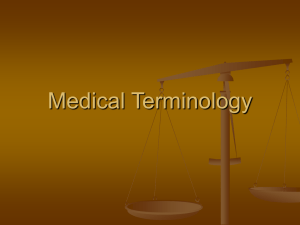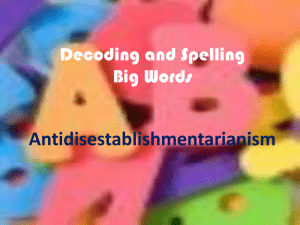Medical/Dental Terminology Course Unit Outline
advertisement
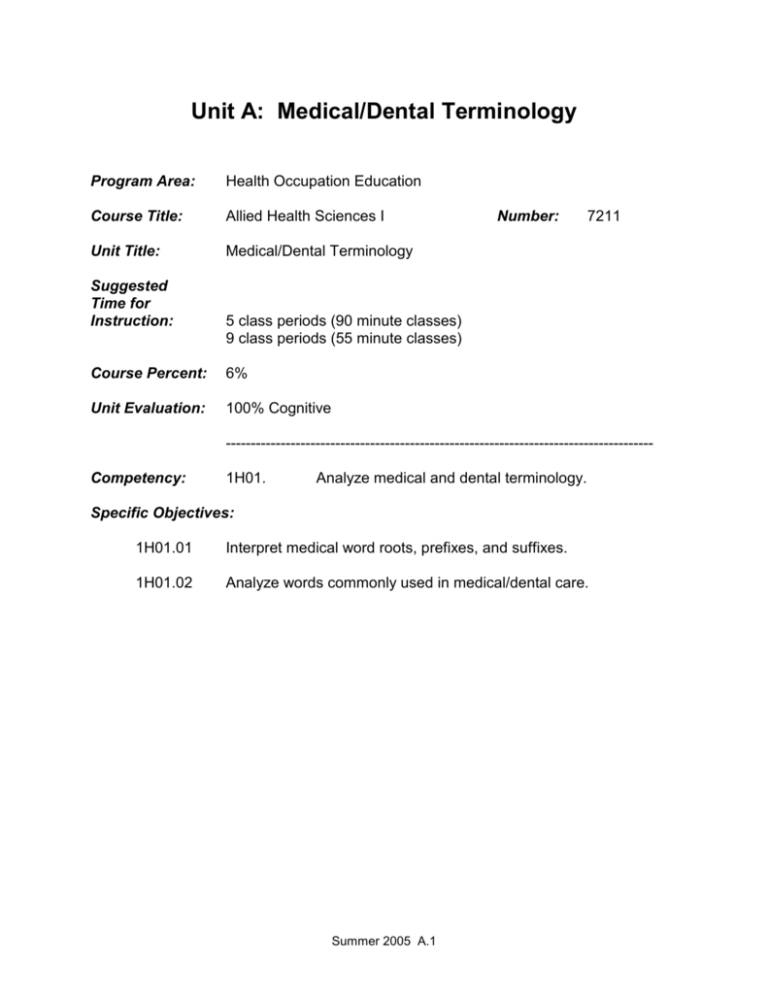
Unit A: Medical/Dental Terminology Program Area: Health Occupation Education Course Title: Allied Health Sciences I Unit Title: Medical/Dental Terminology Suggested Time for Instruction: Number: 7211 5 class periods (90 minute classes) 9 class periods (55 minute classes) Course Percent: 6% Unit Evaluation: 100% Cognitive -------------------------------------------------------------------------------------- Competency: 1H01. Analyze medical and dental terminology. Specific Objectives: 1H01.01 Interpret medical word roots, prefixes, and suffixes. 1H01.02 Analyze words commonly used in medical/dental care. Summer 2005 A.1 Unit A Master Outline A Medical/Dental Terminology 1H01.01 Interpret medical word roots, prefixes and suffixes. A. Word roots 1. aden 2. angio 3. arterio 4. arthro 5. carcin 6. cardio 7. cephal 8. cerebro 9. chem. 10. chole 11. colo 12. costo 13. cranio 14. cyan 15. cysto 16. cyte 17. derma 18. entero 19. epidemi 20. erythro 21. gastro 22. gingival 23. gloss 24. glycol B. Prefixes 1. a,an 2. ab 3. ad 4. ante 5. anti 6. aut 7. bi 8. brady 9. circum 10. contra 11. di 12. diplo 13. dys 14. ecto 15. endo, intra 16. epi 17. hemi 18. hyper 19. hypo 20. inter 21. later Summer 2005 A.2 25. 26. 27. 28. 29. 30. 31. 32. 33. 34. 35. 36. 37. 38. 39. 40. 41. 42. 43. 44. 45. 46. 47. 48. hepat hemo hydro hystero leuko lingua mamm, mast myelo myo nephro, ren neuro ocul, ophthal oophor odont, dent osteo oto ped, pod phleb pneumo, pulm psych rhin salpingo throac trach 22. 23. 24. 25. 26. 27. 28. 29. 30. 31. 32. 33. 34. 35. 36. 37. 38. 39. 40. 41. lipo mal mega, macro micro mono, uni neo ortho peri poly post pre pro pseudo retro semi sub tachy tele trans ultra C. Suffixes 1. a, ac, al 2. algia 3. ase 4. centre 5. cide 6. cente 7. dipsia 8. ectomy 9. emesis 10. emia 11. esthesia 12. genesis, genic 13. gram, graph 14. ia 15. iasis 16. ism 17. itis 18. lysis 19. malacia 20. megaly 21. oid 1H01.02 22. 23. 24. 25. 26. 27. 28. 29. 30. 31. 32. 33. 34. 35. 36. 37. 38. 39. 40. 41. ologist ology oma orrhagia orrhea osis ostomy pathy penia phobia plasty plegia pnea ptosis sclerosis scope stasis toxic trophy uria Analyze words commonly used in medical/dental care. A. Interpret word combinations B. Application Summer 2005 A.3 Unit A Health Care Terminology Competency 1H01: Interpret medical word roots, prefixes and suffixes. Materials/ Resources Badasch, Shirley A. & Chesebro, Doreen S. Introduction to Health Occupations. Latest edition, Upper Saddle River, New Jersey, Brady/Prentice Hall. Ehrilich, Ann. Medical Terminology for Health Professionals. Latest edition. Albany, New York, Delmar Publishers. National HOSA Handbook: Section B. Published by the Health Occupations Students of America, Flower Mound, Texas. Current Edition. www.hosa.org Simmers, Louise. Diversified Health Occupations . Latest edition. Mansfield, Ohio: Delmar Publishers. (Workbook and Teacher’s Resource Kit to accompany this textbook.) Taber, Clarence Wilbur. Taber’s Cyclopedic Medical Dictionary. Philadelphia: F.A. Davis Company. Vaughn, Dean. Medical Terminology - 350 Program Videos. Westwood, Mass.: DCM/ Instructional Systems. (Workbook to accompany this video series.) Phone number - (508) 660-0700 Note to teacher: Lists are provided for roots, prefixes and suffixes. The teacher may use the lists as provided or modify the lists using the disk copy of this curriculum guide. Teaching/Learning Indicators: The following letters are used to indicate specific skills/areas required in the instructional activity. R W M H Reading SS Social Studies Writing S Science Math A The Arts Health professional/parent/community involvement Summer 2005 A.4 Objective 1H01.01 Interpret medical word roots, prefixes and suffixes. Teaching/Learning Activities Critical Thinking A Given a medical word component, have students create an audionym for the term. The student creates a visual that sounds like the component and the picture helps illustrate the meaning. The more unusual the word association the greater chance the student will remember it. (Examples: The word “hyper: sounds like “high purr.” Have the students visualize a cat high in the tree. The term means high or elevated. The root word “erythro” sounds like “A red nose.” Erythro means red.) Note to Teacher: This activity may be done as a whole class or in groups prior to having students attempt to memorize roots, prefixes, and suffixes. The audionyms the students create will serve as memory aides for learning terminology. Teamwork Give students a copy of “Medical Terminology – Word Roots.” (Appendix 1H01.01A) Have students make flash cards and work in pairs to learn the word roots. The same process may be used for “Medical Terminology - Prefixes and Suffixes.” (Appendix 1H01.01B) Teamwork A Working in pairs, have the students trace an outline of one of their bodies on a long sheet of paper. Students then draw and label parts of the body using medical terms. (Example: “cardi-” points to the heart and “hepat-” points to the liver.) Note to the Teacher: This help the students start to learn where the organs are located in the body as well as the word roots. Technology Have students learn word elements by utilizing medical terminology videos and software. There are multiple computer software programs and videos available which focus on medical terminology. Quite often, medical terminology textbooks come with a related tutorial software program. HOSA Have the students start a medical terminology notebook. This notebook can be a great resource preparing for HOSA’s Medical Spelling and/or Medical Terminology competition. Special Needs Each student will reach the highest level of mastery in the least restrictive environment as recommended in the student’s IEP. Summer 2005 A.5 Objective 1H01.02 Analyze words commonly used Teaching/Learning Activities Cognitive Have the students participate in a teacher-led discussion on how word components are combined to form medical terms. After the discussion, have the students practice dissecting combined medical terms and identifying the components in the word as well as the definition (Appendix 1H01.02A) Employability Skills Have students complete the “Matching Health Careers” activity. (Appendix 1H01.02B) Technology R Have the students surf the Internet and look for medical case studies or articles. They should make note of medical terminology words used in the article and try to define them by taking the terms apart and identifying the root words, suffixes, and prefixes. They should verify their definitions by using a medical dictionary. (If Internet is not available, the students may use medical journals.) Critical Thinking Working individually or in pairs, have the students invent/design and construct games or word puzzles using medical terms. Note to Teacher: Scrabble games can be picked up in yard sales and the students can play Scrabble forming medical words. HOSA Have the students participate in Medical or Dental Spelling and Medical or Dental Terminology events in class. This will help prepare students for the regional, state, and national competition. Have students type dictated medical histories on computers. This is great practice for one of the skills in the Administrative Medical Assisting Event. Teamwork Divide the class into teams of 2-4 students and complete the “Medical Terminology Challenge.” (Appendix 1H01.02C) Make 3-4 sets of cards using root words, prefixes and suffixes. Divide the class into 3-4 groups, giving each a set of cards. The teacher can read out a definition and the students must make the correct word using the cards. The first team to give the signal they are done – wins. You can make the signal something fun, and let teams accumulate points. Special Needs Each student will reach the highest level of mastery in the least restrictive environment as recommended in the student’s IEP. Summer 2005 A.6 Unit A: Medical/Dental Terminology Word Roots aden angio arterio arthro carcin cardio cephal cerebro chem chole colo costo cranio cyan cysto cyte derma entero epidemi erythro gastro gingiva gloss glyco gland blood vessel artery joint cancer heart head brain drug gall, bile colon ribs skull blue bladder, sac cell skin intestine among the people red stomach gum tongue sugar hepat hemo hydro hystero leuko lingua mamm, mast myelo myo nephro, ren neuro ocul, ophthal oophor odont, dent osteo oto ped, pod phleb pneumo,pulm psych rhin salpingo thorac trach Appendix 1H01.01A Summer 2005 A.7 liver blood water uterus white tongue breast bone marrow muscle kidney nerve eye ovary tooth bone ear foot vein lung mind, soul nose tube thorax, chest trachea Unit A: Medical/Dental Terminology Prefixes and Suffixes Prefixes a, an ab ad ante anti aut bi brady circum contra di diplo dys ecto endo, intra epi hemi hyper hypo inter later lipo mal mega/macro micro mono, uni neo ortho peri poly post pre pro pseudo retro semi sub tachy tele trans ultra Suffixes without away from toward before against self both, two slow round against two double painful, difficult outside inside upper, above half excessive, , above, more than deficient, below, less than between side fat bad, difficult large small one, single new straight around, many, much behind, after before, in front of forward false backward, behind half below fast distant, far across beyond, excess a, ac, al algia ase centre cide cente dipsia ectomy emesis emia esthesia genesis, genic gram, graph ia iasis ism itis lysis malacia megaly oid ologist ology oma orrhagia orrhea osis ostomy pathy penia phobia plasty plegia pnea ptosis sclerosis scope stasis toxic trophy uria Appendix 1H01.01B Summer 2005 A.8 pertaining to pain enzyme puncture causing death puncture thirst surgical removal vomit blood sensation origin, source pictures, record a disease abnormal condition state of inflammation destruction softening enlarged like, similar specialist study of tumor hemorrhage flow condition of surgical opening disease deficiency fear surgical repair stroke, paralysis breathing drooping down hardening picture, inspection stoppage poisonous development, growth urine Name __________________________________________ Word Root Quiz Fill in the blank with the appropriate word root. 1. muscle _______________________ 2. bone marrow _______________________ 3. head _______________________ 4. uterus _______________________ 5. sugar _______________________ 6. tongue _______________________ 7. blood _______________________ 8. cell _______________________ 9. bone _______________________ 10. cancer _______________________ 11. ribs _______________________ 12. gum _______________________ 13. nose _______________________ 14. water _______________________ 15. skin _______________________ 16. blood vessel _______________________ 17. intestine _______________________ 18. bladder _______________________ 19. drug _______________________ 20. brain _______________________ Summer 2005 A.9 Date _________ Name __________________________________________ Prefix Quiz Fill in the blank with the appropriate prefix. 1. outside _________________________ 2. double _________________________ 3. large _________________________ 4. straight _________________________ 5. across _________________________ 6. fat _________________________ 7. against _________________________ 8. forward _________________________ 9. false _________________________ 10. below _________________________ 11. fast _________________________ 12. new _________________________ 13. two _________________________ 14. without _________________________ 15. inside _________________________ 16. bad, difficult _________________________ 17. round _________________________ 18. self _________________________ 19. behind, after _________________________ 20. half _______________________ Summer 2005 A.10 Date _________ Name __________________________________________ Suffix Quiz Fill in the blank with the appropriate suffix. 1. pain _________________________ 2. inflammation _________________________ 3. tumor _________________________ 4. stoppage _________________________ 5. urine _________________________ 6. poisonous _________________________ 7. fear _________________________ 8. condition of _________________________ 9. hardening _________________________ 10. destruction _________________________ 11. sensation _________________________ 12. breathing _________________________ 13. pertaining to _________________________ 14. enlarged _________________________ 15. surgical repair _________________________ 16. softening _________________________ 17. a disease _________________________ 18. blood _________________________ 19. enzyme _________________________ 20. vomit ___________________________ Summer 2005 A.11 Date _________ Name __________________________________________ Date _________ Medical Terminology Identification Divide each word into word parts, and identify the word part. One example is provided for you. 1. Cardi/ology Cardio = heart 2. Pericarditis _____________________________________ 3. Cyanosis _________________________________________ 4. Dysuria _________________________________________ 5. Hydrocephalic _________________________________________ 6. Hepatomegaly _________________________________________ 7. Hyperemesis _________________________________________ 8. Lipoma _________________________________________ 9. Tracheostomy _________________________________________ 10. Erythrocytopenia _________________________________________ 11. Otosclerosis _________________________________________ 12. Intercostal _________________________________________ 13. Oophorectomy _________________________________________ 14. Hysterectomy _________________________________________ 15. Nephrologist _________________________________________ 16. Hypodermic _________________________________________ 17. Rhinorrhea _________________________________________ 18. Mammoplasty _________________________________________ 19. Pharyngitis _________________________________________ 20. Osteomalacia _________________________________________ ology = study of Appendix 1H01.02A Summer 2005 A.12 Matching Health Careers Who would you go to for the following disorders? Some of the career options may be used more than once. _____1. An eye infection A. A nephrologist _____2. A Craniotomy B. A dermatologist _____3. Blood drawn C. A gastrologist _____4. Hematuria D. A cardiologist _____5. Stomach problems E. A phlebotomist _____6. A carcinoma F. An ophthalmologist _____7. Multiple personality G. A neurologist _____8. A skin rash H. A surgeon _____9. Pericarditis I. An oncologist ____10. A hepatectomy J. Thoracic surgeon ____ 11. Arteriosclerosis K. A psychiatrist ____ 12. Chronic cephalgia L. Dentist ____ 13. Gingivitis ____ 14. Schizophrenia ____ 15. Pneumonectomy Appendix 1H01.02B Summer 2005 A.13 Answer Key: Matching Health Careers __F___1. An eye infection A. A nephrologist __G___2. A Craniotomy B. A dermatologist __E___3. Blood drawn C. A gastrologist __A___4. Hematuria D. A cardiologist __C___5. Stomach problems E. A phlebotomist __I___6. A carcinoma F. An ophthalmologist __J___7. Multipersonality G. A neurologist __B___8. A skin rash H. A surgeon __D___9. Pericarditis I. An oncologist __H__10. A hepatectomy J. Thoracic surgeon __D__ 11. Arteriosclerosis K. Psychiatrist __G__ 12. Chronic cephalgia L. Dentist __L__ 13. Gingivitis __K__ 14. Schizophrenia __J__ 15. Pneumonectomy Summer 2005 A.14 Medical Terminology Challenge Directions: You are to define the following words by breaking them down into components. The only resources you may use are your other team members. The first team to correctly define all the terms will be the winner. GOOD LUCK!! 1. Adenoid 14. Cyanosis 2. Intercostal 15. Dermatoma 3. Homopathy 16. Myalgia 4. Hydrolysis 17. Tachycardia 5. Anesthesia 18. Arteriosclerosis 6. Cystogram 19. Mammectomy 7. Craniotomy 20. Sublingual 8. Glycosuria 21. Erythrocyte 9. Epidemiologist 22. Rhinorrhea 10. Osteopathy 23. Thrombocytopenia 11. Gastrostomy 24. Proctoscope 12. Cardiopulmonary 25. Gingivitis 13. Arthroplasty 26. Microcephaly Appendix 1H01.02C Summer 2005 A.15
